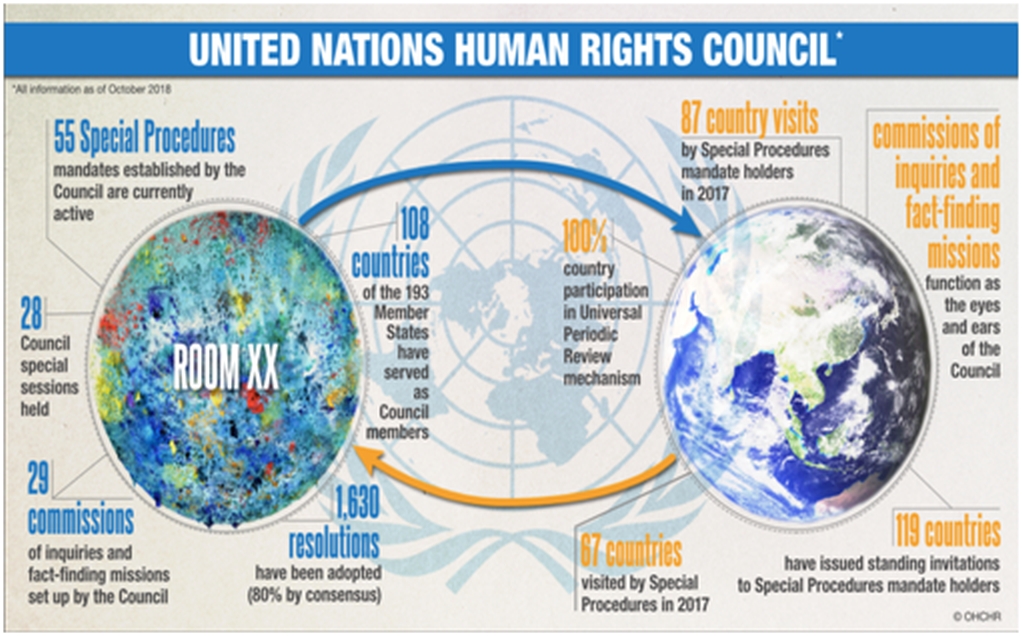
The Human Rights Council is an inter-governmental body within the United Nations system responsible for strengthening the promotion and protection of Human Rights. It addresses situations of human rights violations whenever and wherever they occur and make recommendations on them. It has the ability to discuss all thematic human rights issues and country-specific situations that require its attention throughout the year, including human rights emergencies that could occur. One year after its creation in 2006 (GARes 60/251), the Council adopted its “Institution-Building” package (Res 5/1) and set-up its procedures and mechanisms (UPR, Special Procedures, Advisory Committee, Complaint Procedure). The Council can also establish international commissions of inquiry and fact-finding missions investigating and responding to human rights violations.
Overview
UN (Main) Body
- ‘Subsidiary organ’ of the General Assembly, based in Geneva
- Replaces the Commission on Human Rights (and its mechanisms) since 16 June 2006
- 3 regular sessions per year (4 weeks in March, 3 weeks each in June and in September)
- Is able to hold special sessions, when needed:
o at the request of a member of the Council,
o with the support of one third of the membership of the Council; - Submits an annual report to the General Assembly,
Membership
- Bureau: A president and four vice presidents who represent each of the five regional groups for a 1 year mandate.
- 47 members (States)
o elected directly and individually, by secret ballot,
o by the majority of the members of the General Assembly;
o Members serve for a period of three years, (1/3 of the Council being renewed each year)
o Are not eligible for immediate re-election after two consecutive terms;
o Equitable geographical repartition: Asia (13 members), Africa (13), Latin America (8), Western & Other States (7), Eastern Europe (6).
‘Qualitative’ Membership (OP-8)
- Suspension of membership is possible by a 2/3 majority, in cases of gross and systemic HR violations
- Members elected to the Council shall:
- uphold the highest standards in HR promotion and protection,
- fully cooperate with the HR-Council,
- be subject to UPR review during their term of membership (OP-9).
Basic Principles
- ‘The Council shall assume, review and, where necessary, improve and rationalize all mandates, mechanisms, functions and responsibilities of the Commission (…) to maintain a system of special procedures, expert advice and a complaint procedure’ (OP-6).
- Methods of work of the Council: ‘genuine dialogue, follow-up discussions to recommendations and their implementation (…) substantive interaction with special procedures and mechanisms’ (OP-12).
Voting procedure:
- The Council can adopt texts with or without a recorded vote
- To adopt a draft text y a vote it must enjoy the majority among the members of the Council
- The Council’s decisions are not legally binding
Mandate
The HR Council is responsible ‘for promoting universal respect for the protection of all human rights and fundamental freedoms for all, without any distinction…’ (OP-1); it promote effective coordination and mainstreaming of human rights within the UN system (OP-3);
Its particular tasks (OP-5) shall include:
- Promote
human rights education, learning and advisory services, technical assistance
and capacity building (in consultation with, and with the consent of Member
States concerned);
- Serve as a forum for dialogue on thematic issues on all human rights;
- Make recommendations to the General Assembly for the development of international law;
- Promote the full implementation of human rights obligations undertaken by States and follow-up to the UN Conferences and Summits;
- Assume the role and responsibilities of the Commission relating to the work of the OHCHR;
- Work in close cooperation in the field of human rights with Governments, regional organizations, NHRIs and civil society;
- The work of the Council shall be guided by principles of universality, impartiality, objectivity and non-selectivity, constructive international dialogue and cooperation (OP-4);
- Submit an annual report to the GA
Background Documents
- General Assembly Resolution 60/251 establishing the Human Rights Council (2006)
- HRC Resolution 5/1: Human Rights Council “Institution-building package” (2007)
- HRC Resolution 16/21: Review of the work and functioning of the Human Rights Council (2011)
- GA Resolution 65/281: Review of the Human Rights Council (2011)
- HRC Decision 19/119: Task force on secretariat services, accessibility for persons with disabilities and use of information technology (2012)
- Report of the Panel on Threats, Challenges and Change (2004)
- Report of the Secretary-General “In larger freedom: towards development, security and human rights for all” (2005)
- Addendum to the Secretary-General’s Report: Explanatory Note on the Human Rights Council (2005)
- 2005 World Summit Outcome Document (2005)
- Summary of Commission on Human Rights informal consultations (2005)
- Compilation of Commission on Human Rights Practices (2005)

